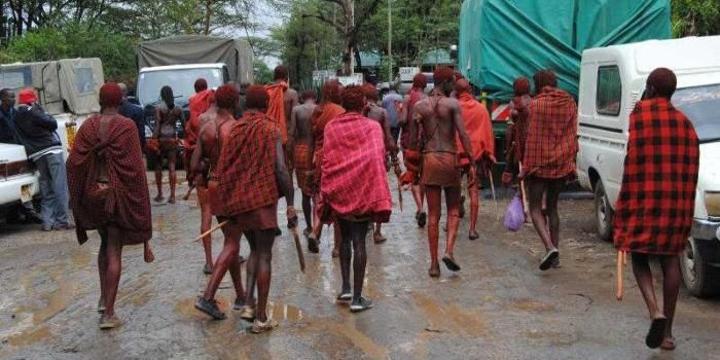Africa-Press – Kenya. Mahatma Gandhi once observed that a nation’s culture resides in the hearts and in the soul of its people.
Culture has been deeply rooted in the conduct of Kenyans as knowledge has been progressively passed from generation to generation by elder folks educating their kin on how matters in the society are supposed to be handled.
Some of these cultures forced the colonial masters to clash with Kenyans as they saw them as peculiar but still they are still practised in some parts of the country.
Kenyans.co.ke researched on some of the cultural practices that continue to thrive even though many foreigners who encounter the practices find them strange or peculiar
1. Childbirth Rituals
A Maasai elder spits on the head of a newborn after birth in the culture of the Maasai community.
According to Milanaoi from Narok county, this practice is in order to keep evil spirits at bay for the entire lifetime of the child.
According to a Sociology and Anthropology report of 2018 by Abraham Rono, the Marakwets of Western Kenya do not allow pregnant women to view bodies of the diseased. In this regard, they are prohibited from attending funerals to avoid misfortunes.
A special necklace is also worn by a pregnant woman with charms to guard the pregnancy against miscarriage and evil eyes.
2. Night Running
This culture is common among communities living in Western Kenya and parts of the old Nyanza province.
Groups of people run at night scaring, dancing and scolding people for the sheer fun and enjoyment of the scene.
Members of the practising communities term the night runners as guardians of the community in the night. In a candid interview with Citizen TV, Monika the self-proclaimed governor of the night runners indicated that they do not harm their victims.
Back in 2015, they requested the then Cabinet Secretary of the Ministry of Arts, Sports and Culture Hassan Wario to recognize them.
3. Women to Women Marriages
The Akamba from the lower Eastern allowed women to marry fellow women in a formal agreement with their husbands.
According to Nguli, an elder from Machakos county affirmed that barren women were allowed by their husbands to marry a woman for them to sire children with for the continuity of the family.
The married woman is supposed to live in the house of the woman that marries them.
4. Shaving of Heads
According to Milanoi, women in the Masaai community shave their heads bald while their male counterparts spend a great deal of time styling and grooming each other’s elaborate hairdos. A man’s long “mane” represents strength, protection and masculine beauty.
However, they are allowed to shave their heads during rites of passage such as circumcision and marriage.
In Kikuyu and Kamba cultures widowed women and their first daughters shave their heads as a sign of mourning their bereaved husbands.
5. Burials
The Luhya from the western region let the spouse of the deceased spend time alone with the corpse in their house for final rituals.
According to Kubasu, a member of the Luhya community, unmarried women with children were buried at their own parent’s homesteads, but close to the fence of the compound.
In funerals, the much the ululations made by mourners signified the respect accorded to the diseased in the community.The Leader of a family is buried head facing the homestead. This is inorder for him to watch over the homestead while at the after life.






